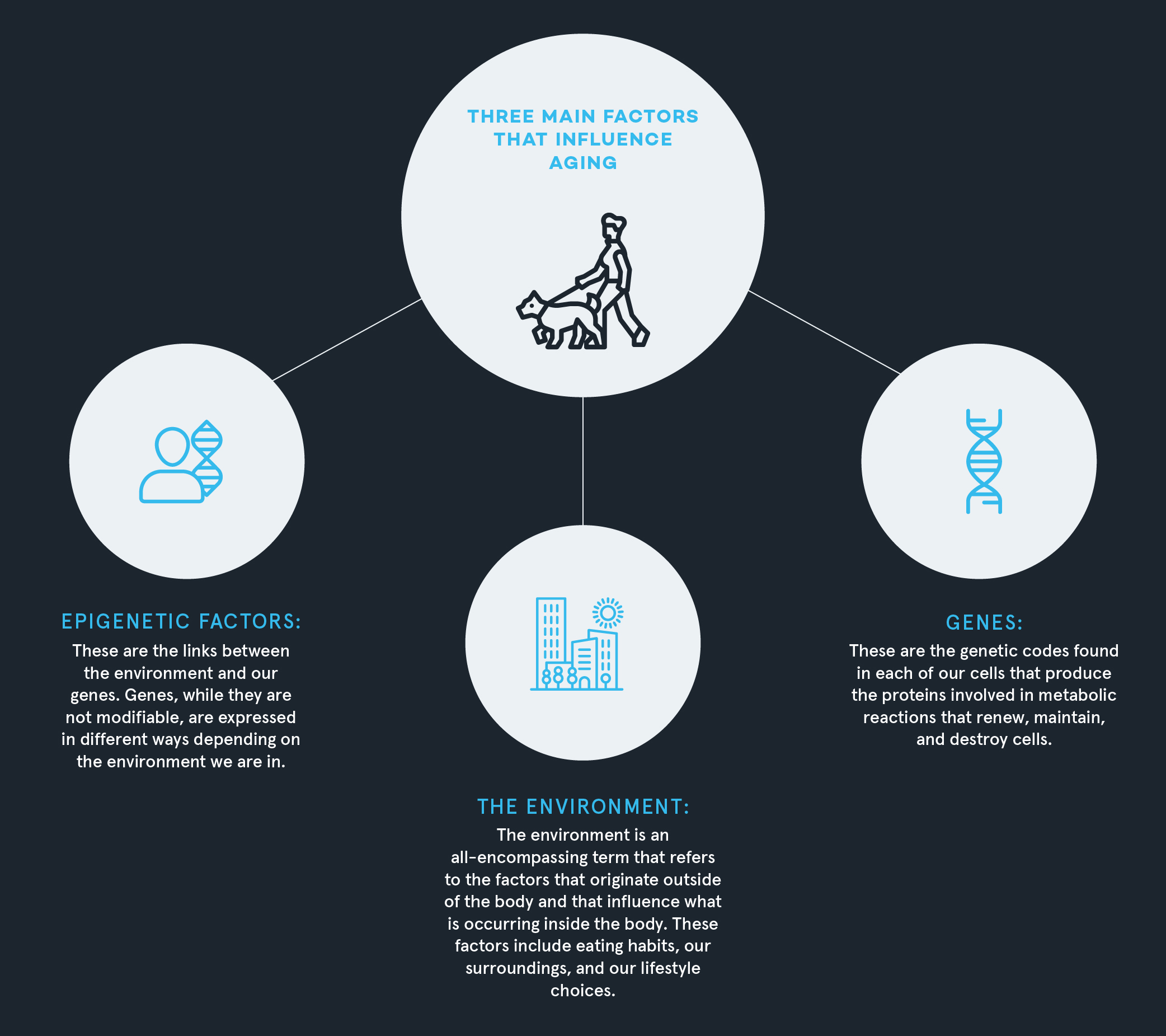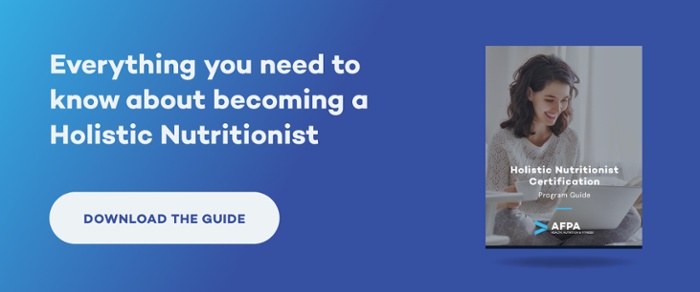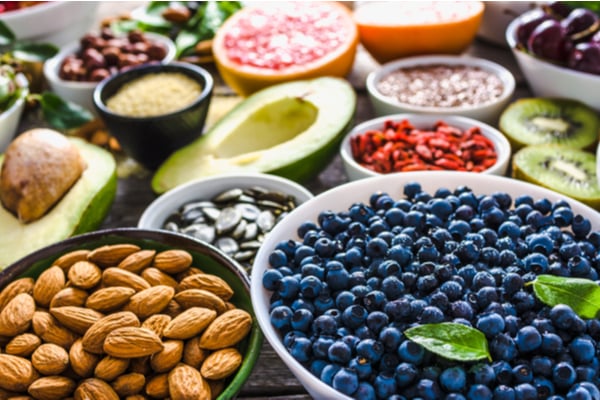As a health professional, one all-encompassing way to discuss with your clients why it is important to make long-lasting lifestyle changes is to discuss the impact of what we put into our bodies on how we age.
But, before you smirk at the title of this article and close this page…
… know that we’re not talking about magic pills that will make your clients live forever.
When we talk about aging, we are referring to the scientific definition of aging: the damage and death of cells and tissues and their slowed or impaired function.
In short, biological aging has little to do with time, and lots to do with the chemical processes that happen within our cells. These chemical processes result in cell damage and death, and the inability of our body to regenerate these cells effectively. As a result, we get sick, and some of these illnesses lead to our death.
So, when a supplement “slows aging,” it doesn’t turn back time or make you immortal. Instead, it interacts with the body’s normal metabolism and other chemical processes to protect cells and promote cell renewal.
In other words, slowing aging means you’ll live a longer, healthier life.
How effective are supplements to help slow aging?
Here, we review the research on the top anti-aging supplements to help you answer that question.
Three Main Causes of Aging
Biological aging results from chemical processes in the body and environmental and lifestyle factors. Age-related changes are damaging, progressive, and accumulate in the body. Age changes the function and the structure of a body (how it works and how it looks). However, aging is independent of time (so aging can be slowed or sped up), and not all bodies experience aging in the same ways.
Aging cannot “stop,” but research shows that since some of the causes of biological aging are modifiable, like lifestyle and environmental factors, aging doesn’t have to result in sickness, and the speed at which we age can be altered.
Let’s illustrate this by looking at the three main factors that cause aging shown in the following diagram:

As we can see from the infographic above, how fast we age and how we age isn’t dependent solely on our genes or on the choices we make, but rather a combination of the two.
7 Supplements That May Slow Aging
Can these anti-aging supplements be part of the solution? There are many things you should consider before recommending or taking a supplement, including how effective they are for what they claim to do.
Here, we review the evidence behind seven supplements that may have the potential to slow aging.
If you want to dig deeper into the science behind the aging in the human cell, you can refer to this article.
Curcumin
What Is Curcumin?
Curcumin is one of the most-studied natural supplements in existence. It is a compound that is derived from turmeric, an orange-yellow aromatic spice that has been used in South and Southeast Asian cooking at least as long as it has been used as an Ayurvedic medicine (around 4,000 years). It is the spice that gives most curries their golden yellow color, and it is also used as a food preservative and natural yellow dye.
Curcumin is a polyphenol, which refers to a group of chemicals that have been studied due to their many health-promoting properties, including antioxidant, anti-inflammatory, anti-allergenic, anti-atherogenic, anti-thrombotic, and anti-mutagenic effects. Polyphenols have a positive effect on the human immune system by increasing the production of white blood cells and cytokines. All of these effects may be relevant in fighting premature aging.
Does It Work? What the Research Says
Curcumin has been used in Ayurvedic medicine for a range of illnesses, and research has demonstrated that it does, indeed, have many positive, potentially disease-fighting effects on the body.
It binds to proteins and inhibits the effects of several kinases, which are enzymes that are involved in cell aging processes, including in the aging of the heart.
Additionally, biochemical research shows that when curcumin is present, it has the potential to get involved in many other molecular processes like DNA transcription, reducing the expression of inflammatory enzymes and activating cell survival proteins.
Curcumin is called “the Indian Solid Gold,” a nickname that makes tribute to its origins and its health value. It has been shown to have numerous therapeutic activities, including promoting the health of skin, lungs, and the gastrointestinal system and helping to reduce aches and pains.
Note that some research documents the low bioavailability of curcumin, meaning it is not easily absorbed by the body or is rapidly eliminated. For this reason, different forms of curcumin are being explored in the laboratory to increase the absorption into the body.
Even though bioavailability of curcumin may be limited, it has been shown to be effective against numerous human diseases in its original form, including cancer, heart disease, diabetes, arthritis, neurological diseases, and Crohn’s disease–all of which are aging-related diseases.
EGCG
What Is EGCG?
EGCG stands for epigallocatechin-3-gallate (EGCG), and it is a polyphenolic compound in green tea. Together with catechin, it is one of the compounds best known for green tea’s health properties.
EGCG is a catechin, which is an antioxidant substance specifically found in tea that helps protect cells and other molecules from damage caused by free radicals. Uncontrolled levels of free radicals can cause oxidative damage that can increase the risk of cancer and other diseases.
Green tea EGCG has been linked to numerous health benefits, including antioxidant effects, cancer chemoprevention, improved heart health, enhanced weight loss, and protection for the skin from ionizing radiation.
Does It Work? What the Research Says
EGCG’s age-fighting properties are linked to the antioxidant nature of the component. One of the most popular and well-supported theories of aging is based on the idea that our cells and bodily systems age as a result of accumulated oxidative damage.
So, if EGCG is a component that successfully helps to ameliorate oxidative damage, then it would be an effective anti-aging component.
Much of the research confirms that EGCG does, indeed help to reduce oxidative damage.
The antioxidant potential of EGCG is so powerful that researchers have developed a topical solution of the component as a way to prevent skin damage caused by UVA and UVB. Since chronic exposure to the UVA and UVB rays emitted by the sun are the main causes of premature wrinkling, skin spotting, and skin cancer, this could be an important advancement in anti-aging technology.
Green tea EGCG has also been studied due to its anti-cancer potential when consumed. Studies have found that EGCG is the most potent anti-cancer agent in green tea. Researchers propose that EGCG could enhance the effect of conventional cancer therapies by making cancer therapies more potent or helping to reduce unwanted side-effects.
Note that EGCG, as it is found in green tea, does have important antioxidant properties, which may help to prevent the development of certain cancers. However, researchers propose that to recommend the therapeutic use of EGCG it will likely need to be consumed in a more potent, controlled, and concentrated forms. Research has yet to be definitive regarding its effects on cancer.
EGCG has potent antioxidant properties, and oxidative damage is one of the causes of cancer and other age-related chronic illnesses. However, research is not definitive with regards to the most effective form of EGCG as a preventative or therapeutic measure on the effects of aging.
Become a Certified Holistic Nutritionist Online in 6 Months or Less
Collagen
What Is Collagen?
Collagen is a fibrous protein that is a natural part of the structure of our skin, nails, teeth, connective tissue, and organ tissue. You might be surprised to know that it is the most abundant protein in the entire animal kingdom! Together with keratin, it helps to give tissue elasticity and strength, plays an important role in tissue development, and helps to strengthen blood vessels.
While there are 16 known types of collagen, up to 90% of the collagen in the body consists of types 1, 2, and 3.
Epithelial cells, which are the cells that are found on the surfaces of your body, produce most collagen. As we age and our skin is exposed to harsh environments, our epithelial cells produce less collagen, leading to wrinkles, stiff muscles and joints, and hardened blood vessels–three well-known signs of aging.
Does It Work? What the Research Says
We know that collagen is an important part of our skin and tissue’s structure, giving it a “youthful” look and resilience, but can taking collagen reduce the impact of aging?
A systematic review of studies on collagen examined the efficacy of supplementation on skin quality, anti-aging benefits, and potential application in medical dermatology. The results were promising. The long-term use of collagen supplements assisted with:
- Wound healing
- Skin agin
- Skin elasticity
- Hydration
- Dermal collagen density
While some of the effects of aging on the skin are what worry some people, others are more concerned with the effects of aging on the bones and joints, like those caused by osteoarthritis. Scientists have also been interested in the applications of collagen for this debilitating condition.
A meta-analysis (a study of studies) looked at the effect of collagen on the Western Ontario and McMaster Universities Osteoarthritis Index (WOMAC) and the Visual Analog Scale (VAS), two indexes that help to measure the severity of arthritis symptoms.
The researchers found that oral supplementation with collagen increased both the WOMAC and VAS score, thus significantly improving osteoarthritis symptoms.
What does this mean? Based on the limited studies available, collagen supplementation may be effective for improving many of the signs of aging related to structural tissue like the skin, cartilage, and bones with no adverse effects in generally healthy individuals.
However, keep in mind that there is limited data and several factors like geographic region, ethnicity, age, and types of collagen supplements are not controlled for in the studies. This makes it difficult to make clear recommendations regarding doses and forms of collagen supplementation for anti-aging.
CoQ10
What Is CoQ10?
CoQ10 is the short name for Coenzyme Q10, an antioxidant substance that our body naturally makes and uses for cell growth and maintenance. It is present in higher quantities in organs such as the heart, the kidneys, and the pancreas.
The oxidative theory of aging proposes that, as the body ages or cells’ metabolism is impaired, antioxidant activity is reduced and oxidative stress markers increase. Similarly, CoQ10, which is an antioxidant substance, naturally reduces in the human body over time.
Before supplementation became an option, researchers noticed that people with diseases have reduced levels of CoQ10, and they proposed that consuming foods high in CoQ10, like herring and trout, or supplementing with external CoQ10 might help people to manage age-related diseases.
Does It Work? What the Research Says
CoQ10 supplementation is of interest to people who are experiencing or at risk of the effects of aging on major organs, especially the heart and blood vessels.
A few studies show that CoQ10 might be effective in helping to prevent and treat heart failure and hypertension and help to treat the effects of heart disease. However, studies point out that this is likely the case only when a person has a demonstrated CoQ10 deficiency.
Even though small studies show that CoQ10 is possibly effective for preventing migraines, there isn’t much evidence to support its use for reducing symptoms of age-related conditions like high blood pressure, Parkinson’s disease, and others.
The research around the role of CoQ10 supplementation in the body is still in the initial stages. Even though initial research is promising with regard to the potential effects of CoQ10 supplementation as an anti-aging antioxidant therapy, there isn’t enough definitive evidence to demonstrate that it is effective across the board.
Resveratrol
What Is Resveratrol?
Wouldn’t it be nice to age like a fine wine? Well, that is the hope when people take resveratrol supplements.
Resveratrol is a polyphenolic (antioxidant) compound that is naturally found in peanuts, grapes, some berries, and wine. The presence of resveratrol in wine, especially red wine, is pointed to as the reason French people have lower rates of heart disease despite having a diet high in fatty cheese and white bread (known as the French Paradox).
Even though there is a weak association between wine drinking and health (sorry!), researchers have grown interested in the effects of resveratrol on the body when it is separated from the wine. Resveratrol as a chemical substance has been shown to have numerous biological activities that have the potential to treat age-related diseases like cancer, cardiovascular disease, and neurodegenerative diseases.
Does It Work? What the Research Says
Many people are interested in resveratrol supplementation because some claim that it can actually extend the human lifespan.
While resveratrol has proven potent antioxidant activities, the question is whether supplementation can benefit human health.
Unfortunately, research that focuses on resveratrol supplementation and longevity is not definitive. While resveratrol has been shown to increase the lifespan of yeast and worms, there is no data that link resveratrol supplementation to longevity in humans.
Regarding heart disease, resveratrol supplementation has been shown to improve vascular health markers in people with metabolic syndrome. Other studies showed that resveratrol supplementation can help to reduce inflammation of the blood vessels and activate heart cells.
In laboratory studies, it appears that resveratrol may be effective in treating cancer, but, for the time being, it is not known whether it is beneficial in cancer treatment or prevention. In fact, since many people with cancer have weakened organ systems, supplementation of any kind could be detrimental to their health, so it is essential to consult with specialized medical professionals before supplementing.
While resveratrol has been shown to have interesting effects on heart health and longevity, the resveratrol supplements available vary significantly regarding the source of resveratrol and the dose per capsule. This variety in supplement offerings makes it difficult to determine a safe dosage for age-related disease prevention.
Can you drink wine instead of taking supplements? The amount of resveratrol in red wine is much lower than that found in supplements, and research shows that the positive results presented here cannot be achieved with the amounts of resveratrol present in two glasses of wine. In other words, if you interested in the effects of resveratrol for your health, these will have a better chance of being achieved with supplements.
Nicotinamide Riboside (NR)
What Is Nicotinamide Riboside (NR)
Nicotinamide adenine dinucleotide (NAD+) is a substrate produced in the body that helps to increase healthspan–or the span of years in our lives we live without disease. In general, NAD+ reduces as we age. There are some chemicals that are precursors to NAD+ that can help improve NAD+ production. One of those precursors is Nicotinamide Riboside (NR), which can be taken as a supplement.
Does It Work? What the Research Says
Based on the knowledge that Nicotinamide Riboside is a precursor to NAD+ production, a chemical that is correlated with a longer, healthier life, researchers examined the effect of NR supplementation on heart health. Heart disease risk increases significantly as we age, and the mechanism of action for NR for increasing NAD+ shows promise for improving heart health markers, inflammation, and others.
One group of researchers carried out two 6-week randomized, double-blind, placebo-controlled, crossover clinical trials where participants took an NR supplement. Researchers found that, in those who supplemented with NR, blood pressure was within healthy parameters, whereas those on a placebo had higher than healthy blood parameters. Additionally, NR supplementation tended to lower the stiffness of key blood vessels.
Another study examined the effect of NR supplementation on aged muscle inflammation through normalizing dysfunctional metabolism. The placebo-controlled, randomized, double-blind, crossover trial found that participants 70-80 years old who supplemented for 21 days reduced inflammatory markers in the aged muscle. Reduced inflammation could improve muscle function and mobility.
Finally, another study found that NR supplementation may help to improve exercise performance in older individuals.
While further clinical trials are necessary to validate the role that Nicotinamide Riboside could have in improving NAD+ levels, and thus longevity, initial clinical trials are promising, especially in its potential effects for mobility and heart health in older individuals.
Creatine Monohydrate
What Is Creatine Monohydrate?
Creatine monohydrate is best known as a sports supplement to help improve high-intensity exercise performance. However, creatine may also be of benefit to some of the physical effects of aging, including neurodegenerative diseases (muscular dystrophy, Parkinson’s, Huntington’s disease, etc.), diabetes, osteoarthritis, fibromyalgia, and brain and heart ischemia.
Does It Work? What the Research Says
Due to the popularity and diversity of applications of creatine monohydrate in sports, exercise, and medicine, the International Society of Sports Nutrition carried out a review of research to update the position stand of the organization. Because of the level of authority of the ISSN on recommendations for supplements for therapeutic purposes, their position paper on creatine monohydrate is a good measure of supplement efficacy.
For the uses of creatine monohydrate on the effects commonly associated with aging, the ISSN concludes that creatine supplementation for treating people with neurodegenerative diseases is safe, well-tolerated, and can be effective for slowing the progression of some brain conditions.
Regarding heart health, creatine supplementation may offer protection of the heart during a heart attack.
Finally, when examining the supplementation of creatine for preventing the progression of aging, research found that it may help to improve brain function with some tasks, including memory, mental fatigue, and speed of information processing.
It is important to note that, while creatine supplementation is generally safe, individuals with renal disease or dysfunction may experience disease progression when taking high doses of creatine.
Creatine supplementation may be an effective therapy in people who are currently experiencing age-related diseases like heart disease and neurodegenerative diseases. It also may help to prevent or slow the progression of the effects of aging on the brain. However, more studies need to be carried out to confirm the effects of creatine on aging.
Main Takeaways
There is a big difference between detecting that a substance, like the ones mentioned here, is effective in the petri dish and demonstrating that it is effective in the human body for preventing and treating age-related conditions.
For the health community to definitively declare that a supplement is effective for age-related conditions, several clinical studies (studies with humans) have to conclude that there is a clear link between taking a supplement and improvements in the health aspect being observed.
There are also several other things that you should consider before taking or recommending a supplement, including quality, mega-doses, and interactions with other medications.
Among the seven supplements reviewed here, the only two supplements that have initial clinical evidence to demonstrate their effectiveness are curcumin and collagen–and even then researchers and health authorities have their doubts.
Something to keep in mind if you choose to take supplements to fight aging: Just like there are supplements that are of high quality, well-absorbed, and efficacious (effective + efficient), there are plenty that are not. This has to do, in large part, with the lack of regulations on supplement fabrication.
What does this mean? Wellness professionals and consumers who choose to take supplements have to take it upon themselves to stay informed and identify high-quality supplements among the dozens of options for each kind.




